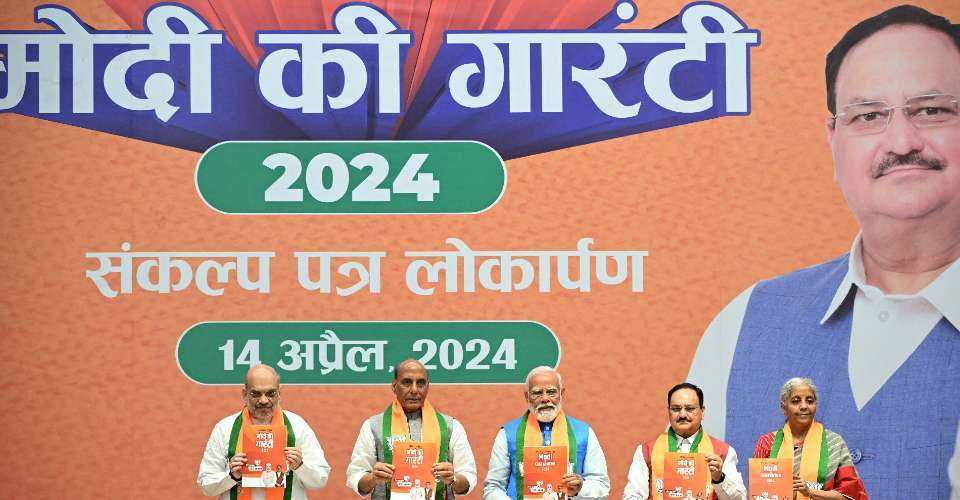
By Nirendra Dev
Prime Minister Narendra Modi’s Bharatiya Janta Party (BJP) has promised to replace existing religion-based civil codes with a common law to govern marriage, adoption, divorce and inheritance norms for all Indians.
The party’s manifesto for the ongoing general election proclaims its belief that “there cannot be gender equality till such time India adopts a Uniform Civil Code [UCC], which protects the rights of all women.”
The Modi government seems to have cleverly linked the strategic poll move with women’s rights, promising that the new law will “draw upon the best traditions, harmonizing them with modern times.”
India’s diverse society has so far allowed its religious groups and large tribal populations to follow their own personal laws and customs or an optional secular code.
The UCC has been one of the three core poll promises of the BJP since its foundation on April 6, 1980. The other two — building a Ram temple in the northern town of Ayodhya and revoking the autonomy of the country’s only Muslim-majority region, Jammu and Kashmir — have already been fulfilled by the Modi government.
The party, seeking a third term under Modi’s leadership in the current polls — the results of which will be known on June 4 — is now focusing on framing a national common law.
A standard personal code for all citizens in a country looks theoretically ideal. Still, in a religiously sensitive and culturally diverse country like India, the concept is more often interpreted as a sign or tool of “imposition” of a Hindu-centric uniformity.
“We are opposed to the imposition of [such] uniformity… But there are certain issues such as equality of inheritance, which have to be welcomed even by the BJP’s detractors,” says analyst Ashutosh Talukdar based in the northeastern state of Assam.
Some politicians in other provinces also share this view but with a warning. “If the move is seen as an infringement on the rich diversity of India, there will be issues,” said a female politician from the Christian-dominated northeastern state of Meghalaya.
Speaking anonymously, she said an inheritance law needs to understand “the traditional practices in their entirety.”
“For example, in Meghalaya, we practice matrilineal systems among Khasis and Garo tribe peoples,” she explained.
Many Muslim leaders see the UCC as interference with centuries-old Islamic practices, including polygamy and instant divorce.
Some others consider a common code as “a violation of the fundamental right of religious freedom” as guaranteed in the Indian Constitution.
Christians are also opposed to the UCC, with the Federation of Catholic Associations of the Archdiocese of Delhi stating that a “united” nation need not necessarily have “uniformity.”
“The UCC should not be brought in, especially when there are large public complaints against the government and the party in power [the BJP] about unduly influencing constitutional institutions for political gain,” federation president A C Micheal said.
It will not be appropriate and desirable to hurry through such a controversial issue, he told UCA News.
According to Christian social workers in the northeast, the rhetoric targeting the Muslim minority is one part of the story.
“Today, Muslims are on the receiving end; tomorrow, Christians will be targeted,” one of them said, echoing the common fear.
Talukdar believes the UCC will impact Christian personal laws on delicate issues like divorce. A section of the Christian community, like the Catholic Church, does not recognize divorce.
The Christian divorce law makes a separation period of two years mandatory for any couple to get a mutual divorce, while the Succession Act of 1925 gives Christian mothers no right to the property of their deceased kids.
Talukdar said these aspects must be re-examined to keep up with the times.
In the Christian-majority Nagaland state in the northeast region, the indigenous Naga tribal people follow extreme male chauvinism in certain matters despite their adopting Christianity and being English-educated.
In some societies, women do not have rights to their husbands’ wealth after their death; their brothers share it.
The tiny community of Parsis also have their law based on their customs and practices. Under the Parsi Marriage and Divorce Act of 1936, any woman who marries someone from another religion loses all rights to Parsi rituals and customs.
Parsis also do not recognize the rights of adoptive daughters, while an adopted son can only perform the last rites for the father.
A common civil code that accommodates the traditions of all religions in India may be impossible. However, Prime Minister Modi, if he returns to power for a third successive term, appears bent on introducing one, even if it means upsetting religious minorities.
He may face little opposition as rival parties to the BJP appear divided on the contentious issue.
Media reports suggest the main opposition Congress party discussed the issue last year but stated that it would wait for a draft of the proposed UCC before taking an official stand.
Other political parties, such as the Shiv Sena in western Maharashtra state and the Aam Aadmi Party (AAP or common people’s party) that rules Delhi and Punjab in the north, have in the past favored a common code.
However, they are now part of the Congress-led “India” alliance, which is challenging the BJP in the national elections.
The only clear stand appears to be taken by Nagaland’s Deputy Chief Minister T. R. Zeliang, who reportedly said in the state’s legislative assembly that Christians “have to defend their faith and beliefs,” particularly during a crisis.
Emphasizing Nagaland’s Christian majority, Zeliang assertively cited the constitutional provisions safeguarding freedom of religion.
